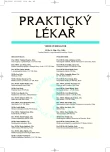-
Medical journals
- Career
Diabetes mellitus as one of the risk factors for colorectal carcinoma. Role of PPAR receptors
Authors: D. Michalský 1; Z. Lacinová 2; M. Haluzík 2
Authors‘ workplace: I. chirurgická klinika, 1. LF UK a VFN, Praha Přednosta: doc. MUDr. Jan Šváb, CSc. 1; III. interní klinika 1. LF UK a VFN, Praha Přednosta: prof. MUDr. Štěpán Svačina, DrSc. 2
Published in: Prakt. Lék. 2007; 87(5): 299-302
Category: Diagnostis
Overview
Type 2 diabetes (DM) is now considered an essential part of metabolic syndrome (also called insulin resistance syndrome, Reaven’s syndrome, or syndrome X). In addition to type 2 diabetes, patients with this syndrome may present with arterial hypertension, dyslipidemia, obesity and several other abnormalities. The presence of type 2 diabetes (DM) is, in addition to its metabolic consequences, also considered a significant risk factor for the development of several malignancies including the colon cancer. As a consequence of the increased prevalence of DM in recent decades, there is an increase in the prevalence of associated malignancies as well. One new possible link between DM and the increased incidence of tumors is a recently discovered group of nuclear receptors PPARs (peroxisome proliferator-activated receptors). Their dysregulation might participate in the development of both DM and cancer. The aim of this article is to summarize recent findings on the relationship between DM and colorectal cancer in view of a possible role for PPAR receptors in the increased incidence of colon cancer in patients with DM.
Key words:
colorectal carcinoma, type 2 diabetes mellitus, PPAR, metabolic syndrome, Reaven’s syndrome, syndrome X.
Labels
General practitioner for children and adolescents General practitioner for adults
Article was published inGeneral Practitioner

2007 Issue 5-
All articles in this issue
- Acute renal failure
- Skin and alcohol
- Health promotion for ageing employees in the workplace
- Occupational Health and company practice
- Somatisation in childhood and adolescence
- The impact an educational film has on secondary school pupils’ knowledge of cardiopulmonary resuscitation
- Nurses and delirious states in hospitalized patients
- Serum tumour markers in the era of development of molecular biology techniques in oncology
- Diabetes mellitus as one of the risk factors for colorectal carcinoma. Role of PPAR receptors
- Differential diagnostic of leucopenias
- General Practitioner
- Journal archive
- Current issue
- Online only
- About the journal
Most read in this issue- Differential diagnostic of leucopenias
- Skin and alcohol
- Somatisation in childhood and adolescence
- Acute renal failure
Login#ADS_BOTTOM_SCRIPTS#Forgotten passwordEnter the email address that you registered with. We will send you instructions on how to set a new password.
- Career

